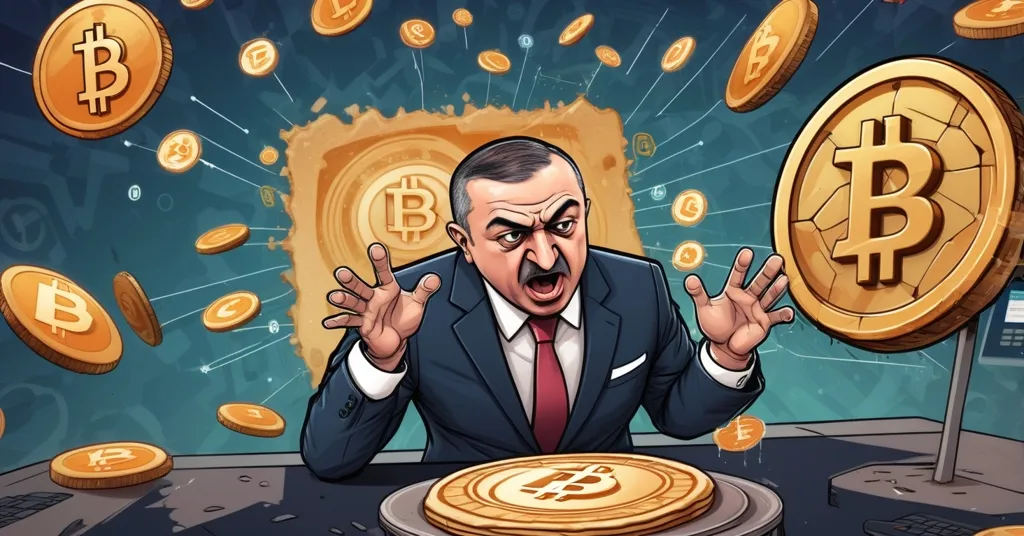Turkey Blocks 46 Crypto Sites Including PancakeSwap in Aggressive Crackdown

Turkey Slams the Brakes: 46 Crypto Sites Blocked in Unrelenting Crackdown
Turkey has unleashed a seismic blow to the cryptocurrency world, with the Capital Markets Board (CMB) shutting down access to 46 crypto-related websites in a sweeping and unapologetic clampdown. Among the casualties is PancakeSwap, the second-largest decentralized exchange globally, as the nation wrestles with economic collapse and the specter of financial crime.
- Broad Sweep: 46 crypto platforms, including PancakeSwap, banned for providing unlicensed services.
- Tightening Grip: New rules mandate user verification, transaction tracking, and lengthy withdrawal delays.
- Economic Pressure: Skyrocketing inflation and a plummeting lira drive crypto adoption, spurring regulatory backlash.
This isn’t just a regulatory tweak—it’s a full-on assault on the crypto landscape in Turkey. The CMB, the country’s financial watchdog, has accused these platforms of offering “unlicensed crypto asset services” in violation of the Capital Markets Law. The blacklist spans a wide range of entities, from decentralized exchanges (DEXs) like PancakeSwap—clocking a jaw-dropping trading volume of over $325.2 billion in June—to trading apps and even informational hubs like Cryptoradar, a price comparison site. This indiscriminate approach signals that Turkey isn’t messing around; if you’re in the crypto space and not playing by their rules, you’re out. For more details on this massive shutdown, check out the latest report on Turkey’s block of 46 crypto platforms.
Decoding DeFi and the PancakeSwap Ban
For the uninitiated, decentralized exchanges like PancakeSwap operate without a central authority, enabling peer-to-peer cryptocurrency trades through smart contracts—think of them as digital vending machines that automatically execute deals without a middleman. Built on the Binance Smart Chain, a blockchain designed for fast and cheap transactions compared to Bitcoin’s slower, security-focused network, PancakeSwap has become a cornerstone of decentralized finance (DeFi). DeFi aims to dismantle traditional financial gatekeepers, offering tools for lending, borrowing, and trading without banks or brokers. But to Turkish regulators, this permissionless, borderless model is a ticking time bomb, ripe for exploitation through money laundering, terrorism financing, and wild market swings that could further destabilize an economy already on its knees.
The ban on PancakeSwap, a titan rivaling platforms like Uniswap and Curve, is particularly stinging for Turkish users who leaned on it for low-cost, high-speed trades—something Bitcoin, with its higher fees and longer confirmation times, often can’t replicate. As someone who leans toward Bitcoin maximalism, I’ll always argue that Bitcoin’s unmatched decentralization and security make it the ultimate store of value. Yet, I can’t ignore that DeFi platforms fill vital gaps in this financial uprising, catering to niches Bitcoin isn’t designed for. Turkey’s decision to axe these platforms without offering a clear licensing route reeks of overreach, potentially alienating a population desperate for alternatives to a fiat currency that’s tanking faster than a shady altcoin after a Twitter hype. For user perspectives on this specific ban, see this discussion on PancakeSwap restrictions in Turkey.
Turkey’s Economic Crisis: The Catalyst for Crypto and Control
Let’s zoom in on why Turkey is so hell-bent on reining in crypto. The nation is grappling with an economic nightmare—inflation soared past 85% in 2022, and the Turkish lira has lost over 60% of its value in just a couple of years. For many citizens, cryptocurrencies have become a lifeline, not just for speculation, but for preserving savings, sending remittances, and escaping a currency that’s bleeding out. Reports from Chainalysis and other blockchain analytics firms suggest a 30% spike in crypto wallet downloads in Turkey during these turbulent times, reflecting a grassroots push for financial autonomy. To understand the broader economic fallout from such crypto restrictions in Turkey, the data paints a grim picture.
Yet, where citizens see salvation, the government sees chaos. The CMB fears that unchecked crypto markets could exacerbate volatility or serve as conduits for illicit funds, a concern echoed by international bodies like the Financial Action Task Force (FATF). This crackdown isn’t Turkey’s first rodeo with crypto either. In 2021, the country banned digital assets for payments, citing risks to financial stability—a move that triggered public outrage and legal challenges. The backlash didn’t deter regulators; if anything, it hardened their resolve, leading to the current wave of restrictions that make the 2021 ban look tame by comparison.
A Regulatory Straitjacket: New Rules for Crypto Users
The CMB has rolled out a set of rules that could make even the most patient crypto user tear their hair out. Here’s the rundown of what Turkish platforms and users now face:
- Identity Verification: No more anonymity—users must submit full ID details to trade or transact.
- Transaction Descriptions: Every transfer needs a purpose explained in at least 20 characters, adding bureaucratic friction.
- Withdrawal Delays: Funds are held for 48 hours on most withdrawals, extending to 72 hours for first-time withdrawals from new accounts.
- Small Transaction Loophole: Transfers under 15,000 lira dodge ID checks, but splitting larger sums to exploit this can flag or block accounts.
These measures aim to curb fraud and illicit activity, but they also strip away the pseudonymity and speed that make crypto appealing. For Turkish users, accessing the 46 banned platforms now requires risky workarounds like VPNs, which sit in a legal gray area and expose them to data leaks or government scrutiny. Worse, pushing activity underground could fuel black market trading, rife with scams and rug pulls—where developers hype a project, take the money, and vanish—defeating the very purpose of the CMB’s clampdown. Curious about the specifics of these website blocks? Dive into this update on Turkey’s 2023 crypto platform bans.
Global Regulatory Storm: Turkey Isn’t Alone
Turkey’s heavy-handed approach mirrors a broader global trend of governments trying to tame the wild west of blockchain tech. Russia, for instance, passed a 2022 law mandating crypto firms to register with its central bank, while cracking down on anonymous transactions. Venezuela, battling its own hyperinflation, has restricted crypto exchanges to control capital flight. Kazakhstan, once a crypto mining hub, tightened regulations on energy-intensive operations, and the Philippines has blocked several unlicensed platforms to combat fraud. These actions reflect a shared anxiety: cryptocurrencies’ borderless nature threatens centralized financial control, especially in nations with fragile economies. For a deeper look at how Turkey’s policies compare, explore this analysis of global crypto adoption and regulation.
Contrast this with places like El Salvador, which embraced Bitcoin as legal tender in 2021 despite economic headwinds. The results are mixed—some Salvadorans have gained access to financial tools, while others struggle with volatility and adoption hurdles. Still, it’s a stark foil to Turkey’s iron-fist tactics, raising the question: could a balanced embrace of blockchain tech offer more stability than suppression?
Playing Devil’s Advocate: Is There Method to the Madness?
Now, let’s flip the coin and consider the CMB’s perspective. Could this crackdown, as brutal as it seems, be a necessary evil? Turkey’s economy is on life support, and unregulated crypto markets could indeed amplify volatility or funnel money to criminal enterprises. The focus on anti-money laundering (AML) and counter-terrorism financing (CTF) aligns with global standards, and protecting naive investors from scams—think pump-and-dumps where prices are artificially inflated then crashed—isn’t a baseless concern. The crypto space is hardly a utopia; for every genuine project, there’s a con artist waiting to fleece the unwary. For insights into the motivations behind such restrictions, this report on Turkey’s regulatory crackdown in 2023 offers some context.
But here’s the pushback: blanket bans without a collaborative framework ignore the transformative power of blockchain. Look at the European Union’s Markets in Crypto-Assets (MiCA) regulation, which seeks to balance AML/CTF compliance with innovation by providing clear licensing paths for crypto firms. Turkey, by contrast, offers no such roadmap. Platforms like PancakeSwap are stranded in limbo, and users are left with few legal options. Short-term control might buy stability, but it risks stifling a tech revolution that could integrate Turkey into the global digital economy. History shows that banning innovation rarely works—tech finds a way, often through darker channels.
User Fallout and Unintended Consequences
For Turkish crypto enthusiasts, the immediate impact is a gut punch. Access to these 46 platforms is severed unless users resort to VPNs or peer-to-peer (P2P) trading, both of which carry significant risks. VPNs might expose users to legal penalties or cyberattacks, while P2P markets are a breeding ground for fraud. A domestic law firm is reportedly preparing to contest the restrictions, echoing the legal battles of 2021, but the regulatory framework offers little clarity on appeals or compliance pathways. Meanwhile, the diversity of banned sites—why target informational tools like Cryptoradar alongside DEXs?—underscores the CMB’s scattershot approach, potentially overreaching into areas that pose no real threat. To explore how these DeFi bans affect users, this discussion on the impact of crypto restrictions sheds some light.
Longer term, this suppression could backfire. Alienating a tech-savvy populace seeking financial alternatives amid economic despair might drive more activity into shadowy corners of the internet, where oversight is impossible. If anything, it highlights Bitcoin’s resilience as a censorship-resistant asset—unlike DeFi platforms reliant on specific interfaces, Bitcoin operates on a network that’s damn near impossible to shut down. Still, losing access to altcoin and DeFi ecosystems limits the broader experimentation that fuels this financial revolution.
Looking Ahead: Suppression or Acceleration?
As a staunch advocate for decentralization and effective accelerationism, I see Turkey’s actions as a step backward from the promise of financial freedom. Bitcoin and blockchain tech are here to disrupt the status quo, empowering individuals over institutions, and while DeFi projects and altcoins aren’t flawless, they test the boundaries of what’s possible. Turkey might gain a fleeting sense of control with this crackdown, but at the cost of innovation. Will this iron grip secure the economy, or merely delay the inevitable rise of a decentralized future? For a comprehensive overview of the legal landscape, refer to this resource on cryptocurrency regulations worldwide.
I’d argue for acceleration over annihilation. Imagine Turkey partnering with blockchain pioneers to craft a regulated yet open ecosystem, much like Singapore’s balanced framework. It’s not just wishful thinking—nations that adapt rather than resist often reap the rewards of early adoption. For now, the CMB seems blind to the reality that you can’t ban the future; you can only stall it, and usually at your own peril.
Key Questions on Turkey’s 2023 Cryptocurrency Crackdown
- Why Did Turkey Ban 46 Crypto Websites in 2023?
The Capital Markets Board flagged these platforms for offering “unlicensed crypto asset services” under the Capital Markets Law, citing risks of money laundering and terrorism financing as major drivers for the ban. - How Do These New Regulations Affect Turkish Crypto Users?
Users must comply with strict ID verification, detailed transaction reporting, and withdrawal holds of 48-72 hours, curbing anonymity and convenience unless they risk illegal bypass methods like VPNs. - Is Turkey’s Crypto Clampdown Part of a Wider Trend?
Yes, it aligns with actions in countries like Russia and Venezuela, where governments are imposing restrictions on unregulated crypto platforms to maintain centralized financial oversight amidst economic challenges. - Could Turkey’s DeFi Ban Harm Its Economic Future?
Quite possibly, as it may push desperate citizens into black markets and exclude Turkey from the global digital economy, missing out on blockchain’s potential to address systemic financial issues. - Does Bitcoin Gain Ground Amid Turkey’s DeFi Restrictions?
Bitcoin’s decentralized, censorship-resistant nature shines here, potentially reinforcing its dominance over altcoin and DeFi ecosystems that suffer more directly from platform-specific bans like this one.



